"And now here is my secret, a very simple secret; it is only with the heart that one can see rightly, what is essential is invisible to the eye." -Antoine de Saint-Exupery
The great nebular structures stretching across our galaxy are evidence of the birth and deaths of stars, or so I -- an astrophysicist -- have been telling you. But an apparently void region of our sky was discovered to house a nebula so remarkable, that I never would have imagined it could exist in the heavens.
Just a degree or two away from the bright star Alnath, towards the direction between the star clusters Messier 35 and Messier 37, lives a vast complex of gas and dust from a dead star that went supernova sometime around 40,000 years ago.
But it's invisible to the naked eye, even when aided by a good telescope. The supernova remnant is so faint that it wasn't even discovered until 1952, despite being only around 3,000 light years away.
Ladies and gentlemen, in all its glory, may I present to you -- on this Pastafarian* New Year -- the greatest images of the one cosmic sign that has officially left me touched (by a noodly appendage): the Spaghetti Nebula!
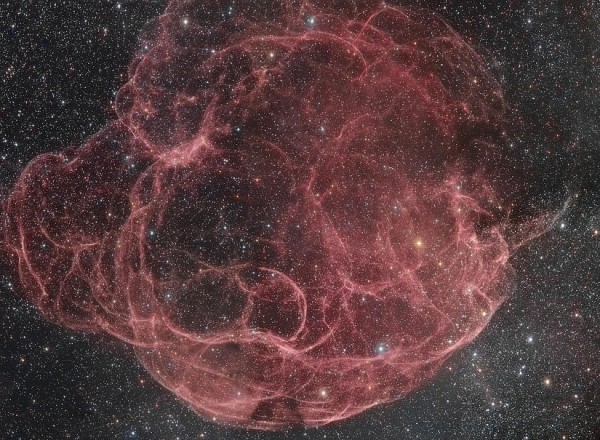
Image credit: Nobuhiko Miki, of http://www.miki-hosp.or.jp/BIND/index.html.
So named because it looks like a plate of Spaghetti, to my eyes it looks like something else entirely, particularly if one looks at -- instead of the bright Hα-line from the supernova remnant -- an amazing 66-color-band composite!
In fact, the best coloring of all -- to my eyes, anyway -- comes courtesy of Emil Ivanov, who truly captures the majesty of this 140-light-year-wide supernova remnant in all its glory.
Can there be any doubt as to what we're looking at? Any doubt at all to Captain Mosey's Eight "I really rather you didn'ts"?
There can be no doubt at all; this is surely the extraordinary evidence we've all been looking for. So bask in His delicious presence, and say it with me.
Our Pasta, who art in heaven,
supernova remnant be thy name.
Thy noodles come, thine sauce be done,
on Earth as it is in the ISM.
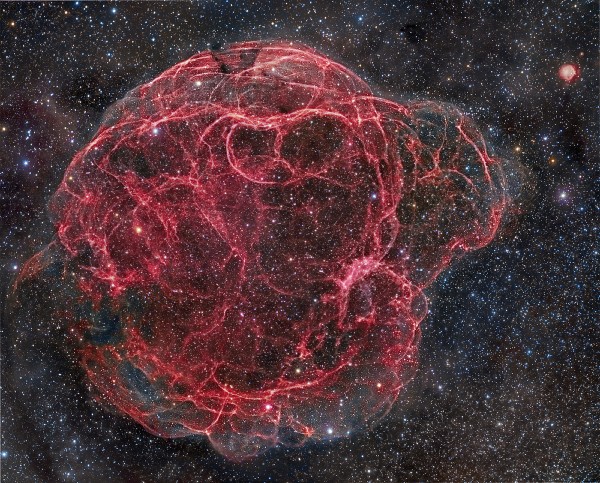
Image credit: Emil Ivanov, from http://www.emilivanov.com/.
Give us this day our long exposures,
and forgive us our selective filterings,
as we forgive those who filter us.
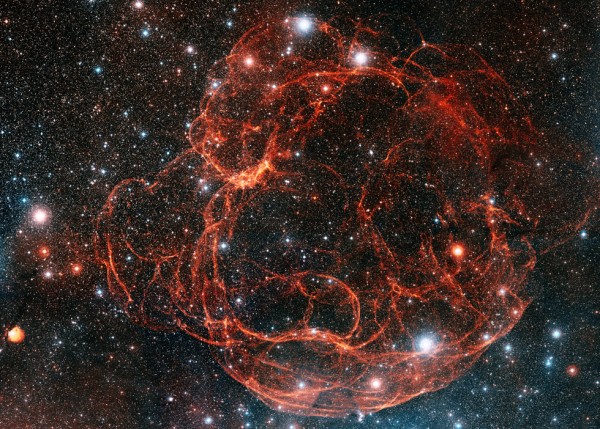
Image credit: Davide De Martin of http://www.skyfactory.org/.
And lead us not into a big crunch,
but deliver us from the heat death.
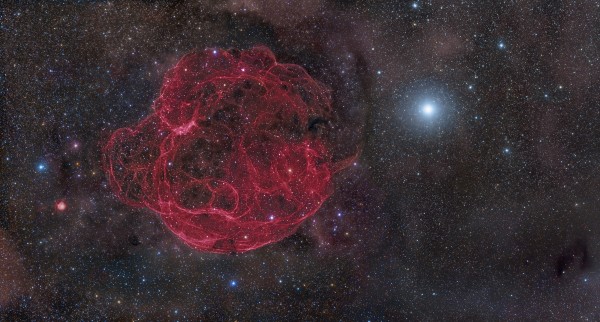
Image credit: Rogelio Bernal Andreo of http://blog.deepskycolors.com/.
For thine is expanding, and gravitating,
and recycling, for ever and ever.
RAmen.
The Spaghetti Nebula is also known as Simeis 147 or Sharpless 2-240, and has been discovered -- like many supernova remnants -- to have a pulsing neutron star at its core. Is this not proof enough for you?
* -- But perhaps I shouldn't have gotten my information concerning the Pastafarian New Year from Uncyclopedia.

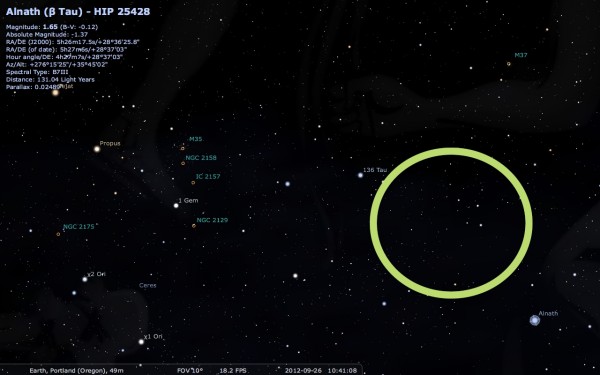
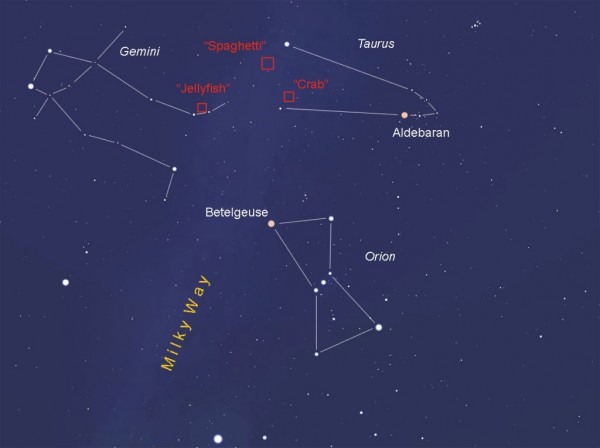
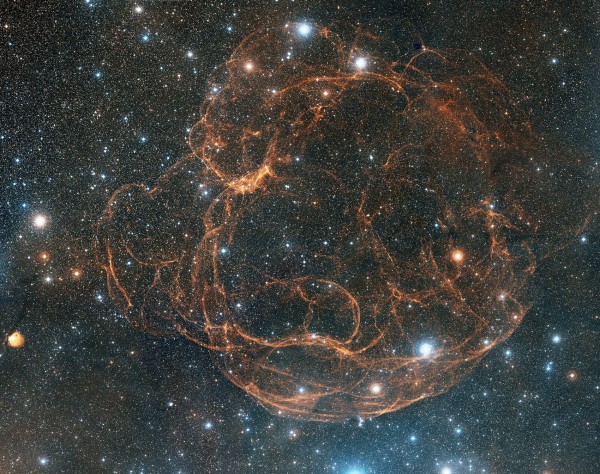
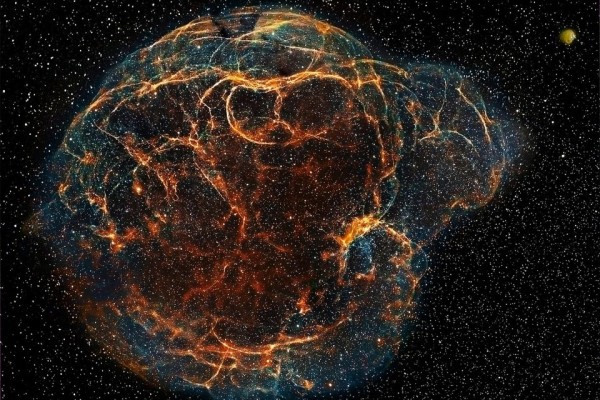
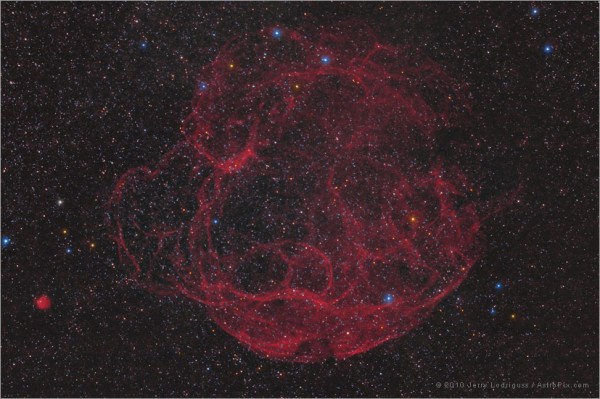
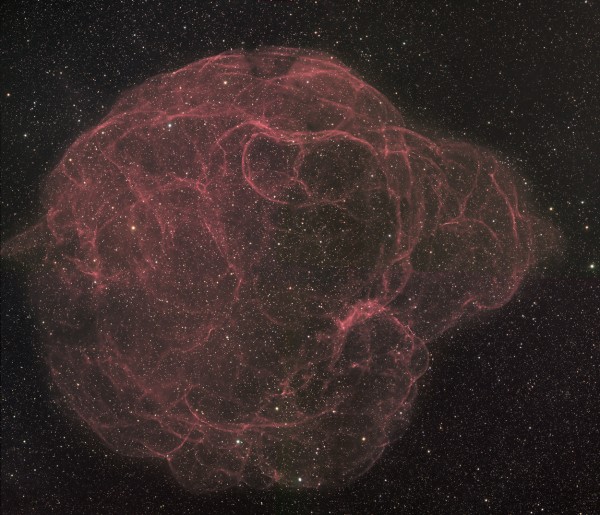
Nice nebula.
and pass the pasta
Urban dictionary's 8 id really rather..
http://www.urbandictionary.com/define.php?term=8%20id%20realy%20rather%…
aye, id really rather you didn't
It's RAMEN not amen! Blasphemer. I demand a correction.
Thy will be done, Shine.
Strangely, a similar image appeared on my toast this morning!
But seriously - Thanks, Ethan, as a layperson I've found you to be informative and uplifting... I'm thinking about getting a kilt.
Love from Arizona and, "Viva Garcia!" -(Jerry)
Love it!
Pasta Be Upon Him.
From giving students and teachers the tools of greatness to... this.
Variety is definitely the spice of life.
Please never change!
"Give us this day our long exposures,
and forgive us our selective filterings,
as we forgive those who filter us."
hahaha!!! so true :D
btw, Ivanov's composition is absolutely amazing. Didn't know there was such a great nebula just above Orion. Thanx Ethan!
How about some sacrificial offering to accompany the incantations? Like sprinkling of holy goat parmisan on the holy pasta?
Sorry Ethan, I mistakenly put my website instead of my location which is in England. Please correct and accept my apology.
I saw the image of the FSM in my plate of spaghetti the other night. It's a sign!
Thanks Dr.Ethan for you informing blog and for your continuous effort to spread knowledge and science.
The following paragraph is from one of your previous blogs which disallows the following comments
"Threats of harm — physical or non-physical — to any person or group of people.
Hate speech, including racist, sexist and anti-semitic speech, and especially including anything that can be construed as encouraging or inciting violence against a group of people.
Spam, including trying to promote your business or direct web traffic from the comments of this blog."
Why not to include hate speech against believers or non believers too?
Why believers and non-believers should disrespect each other. Why not to discuss or have dialogue with respect and reason instead of sarcasm which is hurting to some people.
I saw him too!
But then he disappeared.
I did, however, feel full. It must have been His blessing!
"Why not to include hate speech against believers or non believers too?"
Because it doesn't cause harm, physical or nonphysical?
Busymind,
There's a line there, which I draw at the difference between, "this ___(insert belief)____ that you believe is _____(insert insult of choice)_______" and, "_____(violent/discriminatory call to action)______ against all who believe ___(insert belief)____."
If someone advocated violence or discrimination based on someone's religion I would disallow that as well, but if someone is advancing a particular belief system that one wants to argue against, well, there is a space for that. Particularly if that belief requires adherence to something that can be scientifically falsified.
I suppose if you would like to argue for or against Pastafarianism, I have opened this thread up to that as well. Responses are mostly supportive so far.
RAmen.
I don´t believe in pasta. I´m more of a rice kinda guy.
And noodles! Lot´s of noodles!!
o darn, on my way back home I realised that pasta is the very first we (i.e.Marco Polo) pirated from the chinese and all those imitation ripoffs they sell us are payback.
I´m converted.
Yeeeaaaa pasta!!
"Why not to include hate speech against believers or non believers too?"
Why do you think the policy doesn't cover that? "Including" doesn't mean "exclusively limited to".
hmmm...
Indeed.
What would Rick say.
And May the Pasta Be with you...
Where did the spaghetti go to dance?
The meat ball
Isn't it time for a schism?
Spiced meatballs vs herbed or something like that?
It's about time for one I think.
We can then storm into Italian resturaunts and DEMAND the *correct* form of His Noodly Appendage and proclaim a free meal as compensation if they dare give us the wrong sort or we take them to court for taking our religion lightly!
*sigh* I would have thought the Internet would be bored with this old, tiresome stupidity. I have never seen one FSM comment that was remotely witty, clever, or in any way indicative of using your brain power. Let it die.
I come to this blog for the astronomy, the science. Please stick with that (and the much-appreciated Weekend Diversions, of course). After reading this post, I know nothing more about the Spaghetti Nebula. Why is it so dark? Has it something to do with its chemical make-up, or because it's in a void and not illuminated by nearby stars? Why wouldn't Ethan have imagined it could exist? We get nothing. Worse, we get a joke that has long gone stale.
Svedish Meatballs Forever!
(How's that?)
Splitter!
I may be a minority, (and a heretic), but I believe that only hot sausage is granted by his noodly appendage. All you meatball eaters are damned!
Those who forget the pasta are doomed to reheat it....
@ Wow: Take them to court? What? Why? Then they stand the remote chance of a fair trial. Lets just launch an inquisition and start burning people. The Noodly One would want it that way.
Not Easily Amused.
"Why? Then they stand the remote chance of a fair trial. Lets just launch an inquisition and start burning people."
It's hard to blag a free meal off someone you're burning.
Well, unless he's part of the main course...
What? No, I'm not abusing FSM for personal gain any more than PIRATES (His Chosen) do. I'm into *food* piracy.
Avast Behind!
@Doug Little
the Internet is never bored.
This post is really quite stupid and purposely insulting to theists. I love your blog, but please, leave these sorts of things for the weekends. Judging by the quality of the comment section today, you seem to have riled up the cynical anti-theist crowd something fierce. Another question...can you please provide an example of a belief system that can be "scientifically falsified"? That phrase isn't very scientific at all, is it?
Ha! Well, I'm just here to figure out why my noodle-brain cannot completely grasp why the damn linguini is so stringy. Or, how there is a whole lotta strangeness in my pasta. And how I got mixed up in the whole enchilada...oops...wrong god.
"can you please provide an example of a belief system that can be “scientifically falsified”? "
It was believed that lightning was the wrath of god used to smite sinners.
This belief is scientifically falsified.
And as long as the believers insist on avoiding phrasing their belief scientifically and rigorously, why must the realists hamstring themselves to absolute certainty on "you're wrong"?
All the faithiests do is special pleading.
Which led to the "God of the Gaps" attribution to the faithiest cause.
And, since the faithiests found this insulting (since it was true, the truth hurts), they tried NOMA.
Except this stopped them being able to halt science's progress and teaching of the real situation in the world and the elegance and power of the realist explanation over the ad-hoc and irrational faithiest explanation caused more children to abandon the ridiculous faith, causing their faith-indoctrinated parents to become fearful.
After all, they KNEW, really really KNEW that their children were going to burn for all eternity for abandoning their specific faith.
That it's a load of bollocks was neither here nor there.
Such arrogance WOW. Yet another example of an intelligent person who think their intelligence spans all disciplines. You are as ignorant of philosophy as many believers are of science. A complete fool. Shame.
Funny how someone who has a faith that insists that they are the sole reason for existence complains of "such arrogance".
I guess NJ's problem is I answered the question.
Faithiests don't like answers that aren't "God did it".
I like the way the likes of NC try to hide all their non-facts behind the cover of "philosophy"....
I've been seeing more and more of this lately - I'm pretty sure I can hear real philosophers turning in their grave as their legacy is sullied by mental pygmies using it as a cover for defending their irrational beliefs from rational analysis.
NC,
You're off just a bit. The real reason that religion is not considered as part of science is that it's not scientifically falsifiable, not falsified. There are many "belief systems" that are scientifically falsifiable. These are typically referred to as scientific theories. A scientific theory is an explanation of data that fits all known observations within its domain, and makes predictions about what should be observed. That is, the theory implies that if observation X is performed, then Y will be observed. If Y is not observed, then it's safe to conclude that the theory is false. That's what it means for the system to be falsifiable; not that it's actually false, but rather that it's theoretically possible to prove that it's false with the right observation.
Just as a couple of concrete examples, consider first the wave theory of light. During the 17th and 18th centuries, there was a debate about whether light was a wave or a particle stream. The wave theory was a leading candidate among many scientists, but one of its predictions was that if a small disk-shaped object were placed in a beam of light, the shadow of that object should have a bright spot at its center. This was completely counter-intuitive, but when the experiment was actually performed, the bright spot was there. This lent considerable weight to the wave theory (along with actual wavelength measurements) and led to abandonment of the particle stream theory, at least until quantum mechanics was developed.
Another good example, where the falsification doesn't seem particularly obvious to the lay person is the theory of evolution. This theory states that all life on earth has a common ancestor. There are many observations that could falsify this theory, such as finding a fossil of a modern organism that's reliably dated to the pre-cambrian era or finding an organism that doesn't utilize nucleic acids for its hereditary material.
Now contrast this with a particular, but relatively common, religious belief system, namely belief in the Christian God. The Christian God is supposed to be omnipotent, meaning He can do anything. Given that supposition, what possible observation is there that could falsify the existence of this type of God? There isn't one; since God can do anything, he can certainly modify any observation we care to make. All possible observations are consistent with the existence of God unless you are willing to limit God's properties or capabilities. That may seem to be a strength, but it's actually a weakness because it means that there's no way to perform an experiment that would be real evidence for God's existence.
NC,
BTW, I can certainly answer your actual question if you'd like. There are many "belief systems" that have actually been scientifically falsified. Newtonian mechanics is one such example. Belief in the absolute flow of time is one of the main components of this system. It has been scientifically falsified by synchronizing two very accurate atomic clocks and then flying one of them on an around the world flight. When the flight was completed, the clocks read different times, with the difference being well outside the expected error of the clocks. The conclusion is that the absolute flow of time is wrong and that the relativity of time predicted by Einstein is correct instead.
"The Christian God is supposed to be omnipotent, meaning He can do anything. Given that supposition, what possible observation is there that could falsify the existence of this type of God?"
Since this god can easily prove his existence AND has, according to the texts that delineate his powers and assert his existence, previously done so with fair regularity and indisputable supernatural power, the fact that he hasn't done so in living memory (really, ever since we've been able to spot and record reliably such incidents) is strong proof it doesn't exist.
Wow,
I certainly agree with your point, but you are preaching to the choir. However, a religious believer would likely counter your argument with "God can do anything. He is certainly capable of hiding his existence. He has simply chosen to not reveal His existence directly."
Most religious types see this as a good thing; nobody can ever scientifically disprove their beliefs. However, I take a different tack. The same argument would apply to ANY omnipotent being. Therefore, I go after uniqueness rather than existence. That seems to be even more threatening to Christians than attacks on existence. Of course it leads to them quoting the bible to me, at which time I know that the rational debate is over, so that ends my participation.
“God can do anything. He is certainly capable of hiding his existence."
Indeed he can.
But why?
Given that the proposition is that you have to believe he exists or you get tortured for eternity, it's a bit rich to avoid every attempt to find him to check which version he is and/or what he really wants.
He's deliberately ensuring that you cannot with all honesty know who he is and what he wants and will punish you for it for all eternity.
So if he's hiding then he's not worthy of worship.
Wow,
I can't argue with anything you're saying, other than that there's no way to make an observation that would conclusively disprove God's existence. God can do anything (according to the Christian believers), so there's no observation that cannot be reconciled with a belief in God. As you correctly point out, the logic can get pretty tortured (or even nonexistent). I guess it's just (with apologies to D. Adams) "the ineffable will of the Almighty Bob".
There's also no observation that cannot be reconciled with no God existing.
Moreover, whenever science has been allowed to check on the claims of any god activity, there's been able to be an explanation that doesn't require a god (or even disproves any consistent activity from one.
It isn't that there have been no no falsifiable statements from the faithiests about their god, but that we've never had one that didn't disprove their god.
I think we are in general agreement on the big picture here. Namely:
1. God does not exist.
2. Even if we were wrong and god does exists, god is not a proper subject for science to study.
I was only trying to make the very limited point that an omnipotent god could render any attempt to falsify his existence moot since he could "cook the books" and make any observation fail to conform to what we'd expect to see if god existed. That is, we assume that we would expect to see x if god exists and y if he doesn't when we make a given observation. An omnipotent god could certainly arrange the universe so that we see y even though he really exists.
I make no judgement as to whether, in practice, we ought to believe that god really exists and is just monkeying around with the universe to make it appear that he doesn't. Personally, I adhere to the simpler idea, which is that the evidence shows that god doesn't exist because he actually doesn't. I just was pointing out that logically and theoretically, an omnipotent god could indeed exist even if the evidence shows otherwise. There is no observational evidence that could make a dyed in the wool believer say "that's it, there cannot be a god." Of course, I also agree with you; there's no possible evidence that could make a dyed in the wool nonbeliever say "that's it; there must be a god." God is just not a proper subject, by his very nature, for scientific study.
I disagree with your #2 point.
God, if he acts in this universe at all like the Christians say he does IS a fit question for science to consider.
Problem is, the answer that's coming out of that is "No such thing".
The god of the strong deist isn't something for science to answer because such a god has no action on the universe.
But the christian one is definitely not that sort of god. He interferes in this physical reality all the time according to his rap sheet.
And each interference in this physical reality is a mete subject for science to consider.
Lightning? Nope.
Thuner? Likewise.
The variety of species? Nuh uh.
Illness? Still no.
Resurrection? Heh. No.
Create Earth 6000 years ago? Hell no.
So they have keot schtum about god's effects and special pleaded every instance of his nonappearance but haven't given up on their interventionist god, which is the only tenable position they could take now.
EVERY action god is asserted to take on this physical reality is a proper subject for science to look at.
The refusal of its applicability is solely because every time we look he's not there.
Rather than drop the hypothesis, they beg off.
But that's precisely my point. We can't say that god doesn't exist because all the cases where the religious types have said that "god did it" turned out to not be god. That just means that the religious types had it wrong. They can always come back with "god doesn't want to reveal himself", and there's no SCIENTIFIC way to refute this argument. We can only point to the riduculous way that this stretches credulity.
Just to take your examples and mutate them into what a faitheist might respond:
Lightning: god really is making lightning. You can't say for sure that the separation of electrical charges didn't occur via divine intervention. Besides, god's omnipotent. Therefore, if he wanted to he could make it so that charge separation didn't occur. He doesn't, so he's really responsible.
Thunder: simply a result of the divinely-inspired charge separation that leads to lightning.
Variety of species: god caused mutations, which drives evolution (if a theistic evolutionist). Otherwise, there is no evolution; god created all the "kinds" (Gee I love undefined terms) the way they are. All fossil evidence was placed there by an omnipotent god to test our faith.
Illness: The omnipotent god causes the invasion of our bodies by germs as divine punishment. Why seeming innocent people are so punished is not for us to consider. We cannot understand the mind of the divine creator.
Resurrection: an omnipotent god could ressurect a dead person. The fact that no convincing evidence exists to indicate that this actually occurred is again a divinely given test of our faith.
Create earth 6000 years ago: again, an omnipotent god could create the universe with the appearance of old age. He did this for his own reasons, which we cannot understand, or to test our faith.
Of course, none of these arguments are scientific (or even credible), but that's precisely my point. These point out the fact that observational evidence alone cannot falsify god. We must place limits on what god can or will do in order to use observations to prove the falsity of god. Faitheists, of course, are unwilling to place such restrictions on god. Of course, in science, observational evidence is the ultimate arbiter of the truth of ideas. Since we can't use observational evidence to deal with the idea of god, we can't use science.
Anyway, as a practical matter, don't you think that scientific resources can be better used to do things other than try to verify or falsify the fairy tales passed down by Bronze age shepherds? Why not just ignore the god-botherers and proceed with valuable scientific study?
"We can’t say that god doesn’t exist because ..."
The *correct* answer is "because you're not defining which god you're talking about, leaving it 'Oh some god I won't define until you define how he doesn't exist'".
We can say that the xtian god as delineated in the bible doesn't exist.
Since most interlocutors on US websites and blogs are talking about the christian god because they see the society as christian and themselves or those who they are white knighting for as christians believing in the christian god, the christian god as delineated in the bible (Gideon or KJV) is what they're talking about when they say "God".
And that god is disproved.
If their God is omnipotent, and 5-year-olds regularly die of leukaemia, then their God could save them but chooses not to. Their God is therefore an ethically-challenged being. Which means God is not Good.
Additionally, there are 1,000 different "God"s in the world. Obviously by definition 99.9% of "God"s are non-factual.
This leaves just 1 of those 1,000 different "God"s who can be factual.
But if humans are 99.9% wrong about their "God"s , then the odds on that 1 potentially factual "God" being actually factual are still at least as long s 1,000 : 1.
I think it's pretty safe to say that "God" is a non-factual construct of the superstitious mind.
This is an interesting thread, but this argument is framed incorrectly. First of all, you are grouping all believers of all religions together , which is disingenuous. Not all believers think that earth was created 6000 years ago, and not all believers think that God smotes people with lightning. Perhaps some people used to believe such things, just as some scientists used to believe the universe was heliocentric, but as time passes, our beliefs evolve.
Most of your posts are steeped in cynicism, as though believing in God's existence is tantamount to believing that the earth is flat. Your evidence is that some believers believe that (take your pick) the world was created 6000 years ago, evolution is bogus, lightning is God's tool to smoke sinners, etc.
What none of you seem to understand, or perhaps you do understand but refuse to acknowledge, is, perhaps, the most fundamental argument for God's existence, the argument from contingency. The arguments against God's existence that have been presented here (with one exception, but I'll get to that shortly) are illogical, and fundamentally misunderstand the question.
I'd also remind you that there are many great scientists who do believe in God, and I am certain they are more knowledgeable in these matters than most of the commenters on this page. Are they delusional, or is there a chance they have thought these matters through?
The one argument here that is valid is the pain argument. Someone posted about it earlier. Why would a loving God allow 4 year olds to die of leukemia. Why would he allow a forest fire to burn thousands of animals to death? This is absolutely an argument against God's existence, and one that has been debated by philosophers on both sides of the God argument. If you want to educate yourselves, I'd recommend checking out a religious philosophy journal. You'd learn something that is out of your purview.
All this being said, I am a big fan of this blog, but I have noticed that even Ethan misunderstands the philosophical framework. It appears that his science is sound (as though I'd be in a position to challenge it), but he is a scientist, not a philosopher.
By the way, to all the posters after me, many of which are quite spiteful (this one's my favorite: "real philosophers turning in their grave as their legacy is sullied by mental pygmies using it as a cover for defending their irrational beliefs from rational analysis"), I would take a moment to say that I haven't actually said one word about my personal beliefs on the matter. I merely gently chastised some commenters on this blog for coming to conclusions clearly unsupported by the facts. I think we're all above anonymous internet mudslinging here, but if my posts offend, Ethan can certainly ban me if he likes.
"Not all believers think that earth was created 6000 years ago"
Then they are not worshipping the god of the christian bible.
"not all believers think that God smotes people with lightning."
Then they are not worshipping the god of the christian bible.
Ergo, when they say they are christians, they are lying.
This doesn't seem to be a problem for them, though.
"many of which are quite spiteful"
Compared to "You will be tortured for eternity", every atheist here is practically saintlike in comparison.
"I haven’t actually said one word about my personal beliefs"
Yup, like I said, pretending christianity. Non-claims of a non-specified god cannot be investigated by science. Neither are they a faith in a god, merely mental wanking.
What facts would those be?
"believing in God’s existence is tantamount to believing that the earth is flat"
Well, it is primitive thinking.
"he most fundamental argument for God’s existence,"
If you had *evidence*, you wouldn't need argument.
And you can't wave away your supposedly omnipotent being's failure to act against injustice and suffering by vaguely referring to the ramblings of other credulous fake-philosophers.
It's a very simple point: If *I* see a child about to drown, and *I* have the power to save them, and *I* decide to not save them, then I am an ethical and moral failure.
That's exactly what this "God" is - imaginary or real, your "God" is a failure on ethical and moral grounds.
Luckily, it's blindingly obvious your intellectually incoherent idea of "God" is purely imaginary, so we don't have to worry about an evil, cruel omnipotent being that delights in seeing people suffer, we just have to worry about that significant proportion of humanity that chooses to believe that such a being exists and is their master.
@NC,
I am well aware of many of the philosophical arguments for God's existence, and I think that there are serious problems with all of them. The telological argument, or argument from design, is really just an argument from incredulity. Looking at nature, one finds it hard to believe that it wasn't all designed. That's not a valid argument; it's merely a failure on the part of the arguer to understand how it could occur without divine intervention.
The ontological argument is just as flawed. It rests on a problematic premise, namely that anything that exists in reality is greater than that which exists only in the mind. I find that to be a questionable premise. I can certainly, for instance, imagine a pizza that's better than any pizza that any chef could cook me. Thus, what exists only in my mind is better than anything existing in reality. Further, there's a hidden assumption in this premise, namely that what exists in the mind actually can be said to exist, or at least can be said to exist in the same sense that something that exists in reality does.
I could go on, but I'm sure I won't convince you. However, just consider: take your favorite philosophical proof of God's existence and let's assume for the sake of argument that this proof is valid and sound. Now, replace the term God with "Zeus", "Odin", or "Invisible Pink Unicorns". Is the proof still valid and sound? Why or why not? (I am assuming that your belief is in the Christian God, BTW. You can feel free to correct that assumption if I'm wrong, but nothing in this post is really limited to arguing solely against the Christian God)
"Looking at nature, one finds it hard to believe that it wasn’t all designed."
Actually, I find it VERY VERY hard to believe it was designed.
Bilharzia designed?
Tsetse designed?
Blind spot designed?
But moreover designing everything to precisely that which would manage to continue to exist without regard to the wellbeing of all current lifeforms on the planet is frankly preposterously unlikely.
It would be like trying to design a new nuclear power plant by working out where each and every atom should go.
Wow,
I'm not saying I find it hard to believe that the universe was not designed. I was just quoting that as the basis of the teleological "proof" of the existence of God.
I was just giving the contrary position of the very popular argument of "It's hard to understand how it couldn't be designed", Sean. I didn't consider you to be making it, but showing that personal incredulity equally works there to "prove" god doesn't exist.
It didn't seem to be appropriate before since I hadn't noticed anyone promoting that idea themselves, so I had to take the opening of someone mentioning that it doesn't prove a thing.
Just as "I can't believe it could have been designed" is just as equally NOT a disproof of a god.
Mike on "The Deepest View of the Universe. EVER" mentioned God, but only as his personal perception, not one he ascribes as right, only his. So it couldn't go there.
So a follow up to your correct statement of the argument's lack of proof was it.
Fair enough. Just wanted to make clear to any lurkers reading this (and possibly quickly or without much comprehension) that this was not my personal belief.
I don't believe there really are people that don't worship the Noodliness. There may be some who have wandered to other lesser faiths but, none will not know of the presence of Pasta in the end. I'm sure if those haters in the comments would soften their hearts they would come again to the wonder of the Noodily. Pasta be upon them.
RAmen!
Thank you Ethan, for presenting a wonderful and informative tribute.
I appreciate the discourse, and while I want to discuss these matters in much more depth, I'd rather appreciate Ethan's insights about the incredible universe in which we happen to live. I hope Zeus doesn't strike you all down with lightning bolts from his arse.